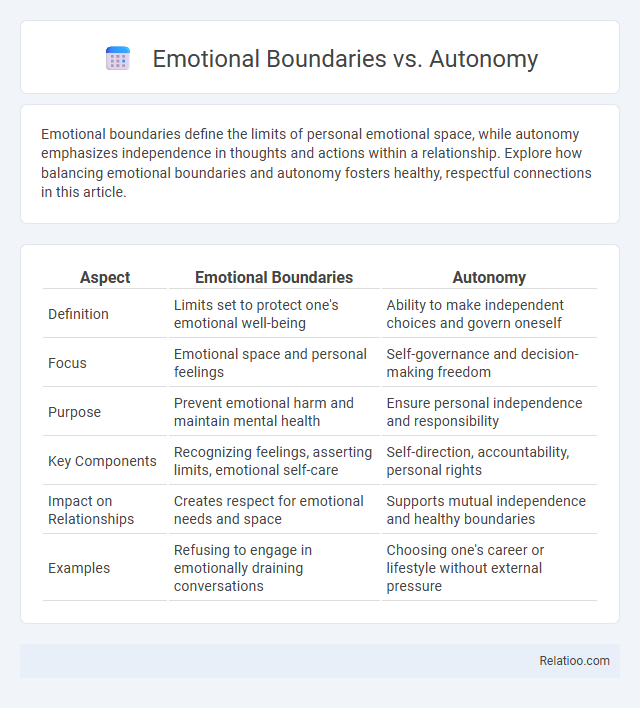Emotional boundaries define the limits of personal emotional space, while autonomy emphasizes independence in thoughts and actions within a relationship. Explore how balancing emotional boundaries and autonomy fosters healthy, respectful connections in this article.
Table of Comparison
| Aspect | Emotional Boundaries | Autonomy |
|---|---|---|
| Definition | Limits set to protect one's emotional well-being | Ability to make independent choices and govern oneself |
| Focus | Emotional space and personal feelings | Self-governance and decision-making freedom |
| Purpose | Prevent emotional harm and maintain mental health | Ensure personal independence and responsibility |
| Key Components | Recognizing feelings, asserting limits, emotional self-care | Self-direction, accountability, personal rights |
| Impact on Relationships | Creates respect for emotional needs and space | Supports mutual independence and healthy boundaries |
| Examples | Refusing to engage in emotionally draining conversations | Choosing one's career or lifestyle without external pressure |
Defining Emotional Boundaries
Emotional boundaries are essential guidelines that help individuals distinguish their own feelings from those of others, ensuring personal emotional autonomy. Clear emotional boundaries prevent codependency by maintaining a healthy sense of self and protecting mental well-being in relationships. Defining emotional boundaries involves recognizing and respecting one's emotional limits while allowing space for others' feelings without over-identification or emotional enmeshment.
Understanding Autonomy in Relationships
Understanding autonomy in relationships involves recognizing Your need for personal freedom while maintaining emotional boundaries that protect individual identity and well-being. Emotional boundaries help define where one person ends and another begins, ensuring respect for personal space without sacrificing connection. Balancing autonomy means supporting mutual independence, fostering trust, and encouraging growth within the partnership.
Key Differences Between Boundaries and Autonomy
Emotional boundaries protect your feelings by defining what you are comfortable with in relationships, while autonomy emphasizes your ability to make independent decisions and maintain self-governance. Key differences include boundaries serving as limits that regulate others' impact on your emotional space, whereas autonomy centers on your personal freedom and responsibility for choices. Understanding these distinctions helps you cultivate healthy interactions without compromising your sense of self or emotional well-being.
Signs of Healthy Emotional Boundaries
Signs of healthy emotional boundaries include clear communication of personal feelings, recognizing and respecting others' emotions, and maintaining a sense of self without over-dependence on others' approval. Autonomy in this context involves the ability to make independent decisions while honoring emotional limits. Establishing these boundaries promotes emotional resilience, reduces codependency, and fosters mutually respectful relationships.
How Autonomy Shapes Personal Growth
Autonomy shapes personal growth by empowering you to make independent decisions that align with your values and goals, fostering self-awareness and confidence. Establishing emotional boundaries protects your well-being, allowing you to maintain healthy relationships without compromising your individuality. This balance between autonomy and emotional boundaries ensures sustainable personal development and resilience.
Common Challenges in Maintaining Boundaries
Common challenges in maintaining emotional boundaries versus autonomy include confusion between independence and emotional connection, leading to blurred lines in personal relationships. You may struggle with balancing your need for self-expression while respecting others' feelings, resulting in either over-involvement or emotional withdrawal. Developing clear communication and self-awareness is essential to preserving both emotional boundaries and autonomy effectively.
Effects of Blurred Boundaries on Autonomy
Blurred emotional boundaries can significantly impair personal autonomy by causing individuals to become overly enmeshed in others' feelings, leading to diminished self-awareness and decision-making capacity. When autonomy is compromised, people may struggle to assert their needs or make independent choices, resulting in increased emotional dependency and vulnerability to manipulation. Maintaining clear emotional boundaries is essential for preserving autonomy, fostering self-respect, and enabling healthy interpersonal relationships.
Setting Emotional Boundaries Without Losing Connection
Setting emotional boundaries without losing connection involves clearly communicating your needs and limits while respecting others' feelings, enabling healthier relationships. Maintaining autonomy means you preserve your sense of individual identity and decision-making power, ensuring your emotional well-being is protected. Your ability to balance these boundaries fosters mutual trust and connection without compromising personal freedom.
Strategies to Balance Boundaries and Independence
Establishing clear emotional boundaries involves recognizing personal limits while maintaining respect for others' feelings, which supports healthy autonomy. Effective strategies include practicing assertive communication, setting consistent personal limits, and fostering self-awareness to navigate the tension between independence and connection. Balancing these aspects enhances emotional well-being and promotes mutually respectful relationships.
Building Respectful Relationships Through Autonomy
Building respectful relationships through autonomy requires recognizing and honoring emotional boundaries while fostering individual independence. Emotional boundaries protect your feelings and personal space, allowing open communication without intrusion, which strengthens mutual trust and respect. Encouraging autonomy empowers each person to express their unique identity and make decisions, creating a balanced dynamic where respect and individuality coexist.

Infographic: Emotional Boundaries vs Autonomy
 relatioo.com
relatioo.com